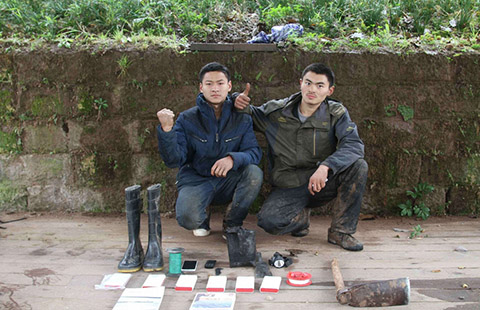'Made in Foshan' made for the home
By Sun Ye (China Daily) Updated: 2016-03-04 07:56"Everything you see in a house, you get it here. Everything you don't see, so long as it's in a house, you also get it here," said Zhang Kaiji, head of the Foshan Bureau of Commerce.
Foshan, the city adjacent to Guangzhou, capital of Guangdong province, is home to the lion's share of both China's home decoration and electrical appliance industries.
Midea, Galanz and other giant household appliance manufacturers are based in the city. Foshan Lighting, as its name suggests, also hails from the city, as do many other producers. Ceramic tiles are a specialty of the city, and the local output accounts for the largest share of the country's total.
From plumbing to furniture, the city boasts the country's best manufacturers. It's also home to the renowned housing property developer Country Garden and is the base for Foshan Haitian Flavouring & Food, the largest manufacturer of soy sauce in the world.
Whether it is furniture, building materials, household appliances, lighting, home textiles, or plastic products, Foshan produces it.
"The complete industrial chain of 'made in Foshan' means that for buyers the city is a one-stop market," according to Liu Xiaoming, deputy chief of the bureau of commerce.
"There is no need to strenuously search for suppliers, they are all within reach here," Liu said. "And Foshan is the label for reliable quality."
Foshan plans to go one step further with its home decoration and appliance industries, whose output amounted to more than 700 billion yuan ($106.8 billion) in 2015, with exports worth $23.4 billion.
The city is developing business-to-business and online-to-offline platforms to directly connect suppliers and buyers. It will also provide logistics, financing tools, e-commerce channels and various other conveniences for buyers.
For suppliers, the initiatives mean less excess production and smaller inventories, as information will flow more smoothly and transparently.
The initiatives have already been implemented in the city's ceramic tile industry, with a new platform integrating financing, big data, logistics, and e-commerce, as well as other Internet Plus services, launched on March 1.
Participating companies are expecting the platform to generate 100 billion yuan in revenue this year, according to the Foshan Bureau of Commerce.
"We hope the platform will lend valuable experience to other industries on how to deal with shifts in growth models and supply-side reform," said Lu Yi, Party chief of Foshan.
But brick-and-mortar markets are still crucial. There are now more than 100 such markets for the home decoration and appliance industries in the city, including massive markets in Lecong township, where buyers from around the world come to shop. The city also plans to set up experience centers and showrooms for one-stop shopping outside their home base. Places in Africa and South America may soon witness such outlets, said Liu, the deputy chief.
Such overseas outlets are expected to enhance a global purchase chain and boost exports. According to the bureau of commerce, the industry's exports to Africa reached more than 58 billion yuan in 2015 and exports to Latin America reached 21 billion yuan.
"With the new initiatives, we hope the manufacturers can discover synergies, cut their production costs and contribute to the brand strength of Foshan," Zhang said.
(China Daily 03/04/2016 page12)
- Suggestions pledged on reform and efficiency
- The project that opened a window to the world
- New faces at National People's Congress
- Digging deep to explore subterranean space
- 110 Long March rockets to be launched in 5 years: scientist
- Mobile HIV testing labs to hit streets in capital
- Veteran journalist named new spokesman of China's top meeting of political advisors
- Elder care seen as a key concern in a graying nation
- Beijing center helps woo foreign talent
- China's lunar probe sets record for longest stay







